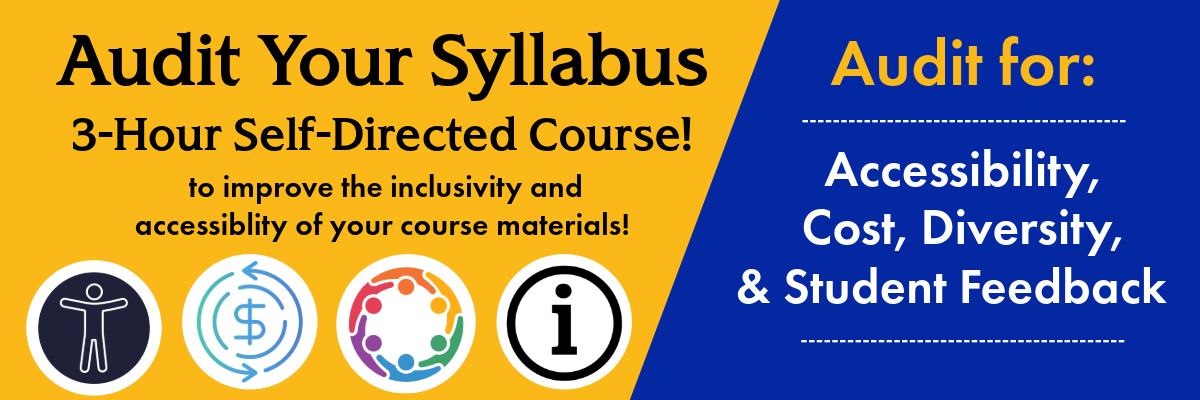Audit Your Syllabus

This program has now concluded. Please check back for future offerings or review the Audit Your Syllabus - Public Version.
This Spring, we are offering a professional development course for faculty and librarians entitled Audit Your Syllabus. Consider applying if you’re interested in:
- reviewing the accessibility, cost and diversity of your course materials
- selecting more accessible and inclusive course materials
- gathering feedback from your students regarding your course materials
- connecting with fellow faculty colleagues
This is a three-hour, asynchronous, and self-paced course with one optional synchronous meeting to be scheduled mid-semester.
In order to receive a $500 stipend, all course work must be completed by May 24th, 2024.
This program has now concluded. It ran from March 4th to May 24th, 2024! The deadline to apply was February 26th.
| Name | Role |
|---|---|
| Jennifer Redd | Program Coordinator |
| Jane Dodge, Liaison Librarian, MLK Library | Program Designer & Facilitator |
| Sara Bakalian, Instructional Designer, eCampus | Program Designer & Facilitator |
List of Audit Your Syllabus Program certificate awardees:
Spring 2024
| Name | Department | College |
| Jennifer Bean | English and Comparative Literature | College of Humanities and the Arts |
| David Barry | Urban and Regional Planning | College of Social Sciences |
| Melinda Simon | Biomedical Engineering | College of Engineering |
| Shawn Vecellio | Teacher Education | College of Education |
| Kate Steffens | Special Collections and Archives | University Library |
| Essy Barroso-Ramirez | University Library | University Library |
| Aubrey Uresti | Counselor Education | College of Education |
| Jihyun Lee | Kinesiology | College of Health and Human Science |
| Seung Ho Chang | Kinesiology | College of Health and Human Science |
| Nancy Park | Communication Studies | College of Social Sciences |
| Julian Vogel | Accounting and Finance | College of Business |
| Mary Hall | Nutrition, Food Science and Packaging | College of Health and Human Science |
| Kunal Sampat | Medical Product Development Management | College of Sciences |
Testimonials
“The Audit Your Syllabus course gave me a fresh perspective on a class that I’ve been teaching for a number of years. I regularly engage in course review, but I appreciated the opportunity to systematically study my course— highlighting accessibility, cost, and diversity. The design of the course is user friendly, materials are thought provoking, and reflection exercises are relevant. One of my favorite aspects of the course is the supportive community that Sara and Jane foster.They are knowledgeable, inspiring, responsive, and encouraging. “
Aubrey Uresti, Counselor Education Department
"The Audit Your Syllabus course covered much more than just the syllabus, making me aware of the tools to check all kinds of course material for accessibility, and more importantly, how to fix them! I now have a better awareness of how course material design affects students with various impediments to their learning, and an understanding of how to design future materials to maximize their usability for all students."
Melinda (Mindy) Simon, Biomedical Engineering